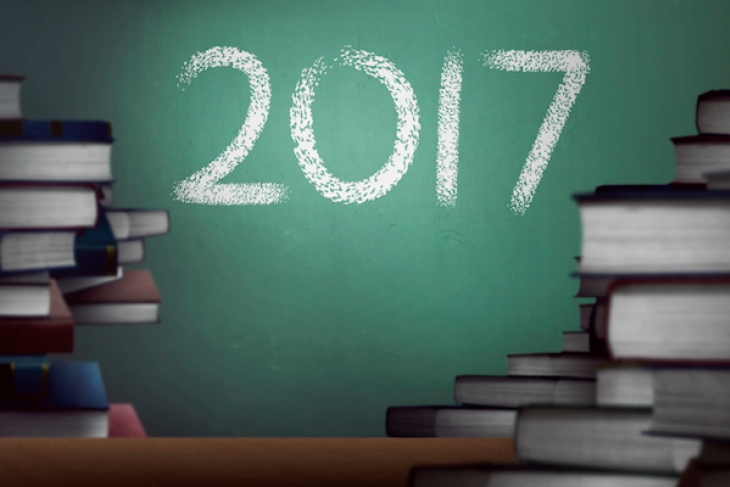The past year has been frantic and fraught, and that was no less true for education. Politically charged debates raged over perennial contentious issues like school discipline and school choice, as well as newer topics like the Every Student Succeeds Act and Secretary of Education Betsy DeVos.
These topics and more show up in the two lists that follow, which comprise fifteen of our most-read articles. The first ten articles come from Fordham staff members, and the last five were written by guests.
The top ten Fordham-authored posts of 2017
1. David Brooks and the language of privilege, by Robert Pondiscio
Responding to New York Times columnist David Brooks, Robert Pondiscio challenged the assertion that the parenting styles of privileged Americans, the so-called “pediacracy,” is ruining America for the rest of us. This provocative piece also prompted a conversation around privilege in education, with responses on Education Post, Joanne Jacobs’s blog, and Fordham’s own Flypaper.
2. Counting down the top 5 education issues for 2017, by Aaron Churchill
Readers’ top five issues were school accountability, e-schools, the new federal administration, ESSA, and charters and choice—predictions that turned out to be rather prescient.
3. Schools are still peddling the self-esteem hoax, by Chester E. Finn, Jr.
Checker Finn’s post on the “faux psychology” that undergirds social-emotion learning stoked a spirited debate, with a host of responses submitted to Education Week, as well as responses and commentary from the Bluegrass Institute, Charles Barone, Joanne Jacobs, Marc Tucker, and Peter DeWitt.
4. One reason why affluent, liberal parents often choose segregated schools, even when that may not be their intention, by Michael Petrilli
Mike Petrilli examined why upper-middle-class parents often put other considerations ahead of school diversity. For more reading, check out his book The Diverse Schools Dilemma: A Parent’s Guide to Socioeconomically Mixed Public Schools.
5. Betsy DeVos's team stumbles on ESSA, by Michael Petrilli
As the initial feedback of the Every Student Succeeds Act state plans came through, the Department of Education’s review of Delaware’s plan raised some eyebrows, as Mike explained.
6. Trump and Congress will repeal Obama's ESSA rules: Why that matters and what should follow, by Brandon Wright
Following the House of Representatives vote to gut Obama-era ESSA regulations—which, as predicted, led to a full repeal—Brandon Wright argued that the Department of Education ought to replace them with new regulations immediately or risk chilling state innovation and opening the door for future administrations to pass rules that go against today’s non-binding assurances—sowing even more chaos down the line.
7. Has the high school diploma lost all meaning?, by Brandon Wright
Following the graduation scandal at D.C.’s Ballou High School, Brandon lamented a situation that’s grown absurd and untenable: We’ve simultaneously lowered the bar for high school graduation while pushing for more high school graduates to attend college.
8. What teens want from their schools, by Amber Northern and Michael Petrilli
Tying in with Fordham’s report on what truly motivates and engages high school students, Amber Northern and Mike explained the many engagement profiles of high school students and what they mean for educators. This one also made the Education Next top-ten list for 2017.
9. Don't let personalized learning become the processed food of education, by Michael Petrilli
With the ever-growing popularity of personalized learning, Mike cautioned against its “mass production,” warning that “personalization” might paradoxically encourage a reductionist type of education that breaks learning into little scraps of disparate skills, disconnected from an inspiring, coherent whole.
10. The collapse of academic standards, by Chester E. Finn, Jr.
Checker warned that colleges are increasingly forgoing remedial education for unprepared freshmen and instead conferring degree credit for what used to be the kinds of high-school-level content and skills that one had to master before gaining access to “credit-bearing” college courses. These lamentable bridge classes, called “corequisites,” are similar in their standard-lowering effect to K–12 grade inflation and credit recovery.
***
Our commentary benefits from the diverse thoughts of engaged guest bloggers. Their contributions are invaluable, and we’re grateful they graced our pages. Here are this year’s most popular articles.
The top five Fordham guest posts of 2017
1. 3 reasons most teachers still believe the learning styles myth, by Daniel T. Willingham
Daniel Willingham, professor of psychology at the University of Virginia and former member of the National Board for Education Sciences, explained how the myth of “learning styles” remains pervasive among teachers and why the belief should be thoroughly debunked.
2. My experience with AP U.S. History: The importance of rigor in bringing history to life, by Alli Aldis
Alli Aldis, daughter of Fordham’s vice president for Ohio policy and advocacy, wrote about her personal experience with AP U.S. History and how to engage students in subject areas that they otherwise may not appreciate.
3. 40 ESSA rules endangered by Republicans' repeal efforts, by Anne Hyslop
Anne Hyslop, an education consultant and former senior policy advisor at the U.S. Department of Education in the Obama Administration, described forty rules endangered by the repeal of Obama-era ESSA regulation.
4. The lasting value of a classical liberal arts education, by Dan Scoggin
Dan Scoggin, the co-founder and chief advancement officer of Great Hearts, argued that America is facing a crisis in educating students to meet an increasingly complex world. He said the best way to develop our graduates’ skills and talents for an evolving twenty-first-century economy is a classical liberal arts education.
5. Connecting psychology research to gifted education practice, by Matthew C. Makel, Rena Subotnik, Paula Olszewski-Kubilius, and Jonathan Plucker
Organized around a set of twenty research-based learning principles for gifted education, this synthesis introduced readers to each principle and how it’s relevant to teachers, and provides a list of actions that teachers can take to incorporate these principles into their classroom to promote learning and development.
***
Congratulations to all of our bloggers. And a very special thanks to our readers! We look forward to writing about the education policy, news, and challenges of 2018.

